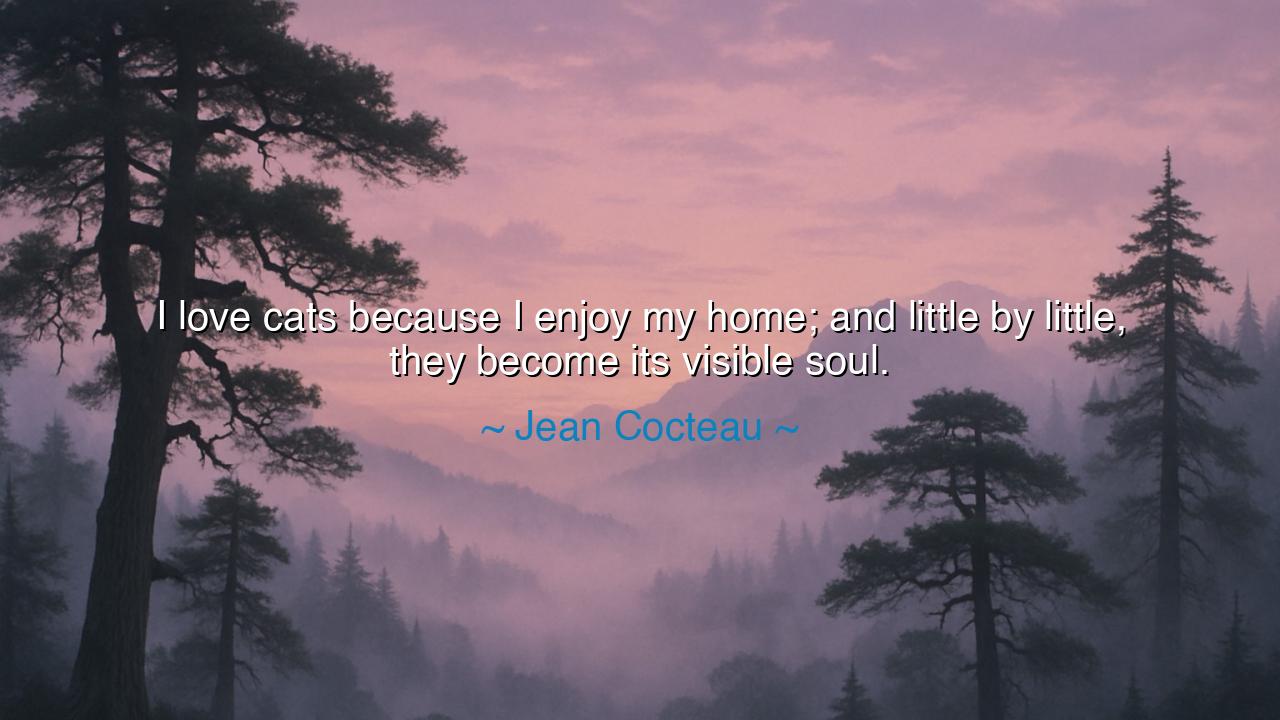
I love cats because I enjoy my home; and little by little, they
I love cats because I enjoy my home; and little by little, they become its visible soul.






“I love cats because I enjoy my home; and little by little, they become its visible soul.” So wrote Jean Cocteau, the French poet, playwright, and dreamer who wandered between worlds — of art, of love, of myth. His words, tender and profound, speak not merely of affection for an animal, but of something far greater: the mystery of companionship, the quiet divinity of home, and the invisible essence that gives a dwelling its soul. In the figure of the cat, Cocteau found the spirit of stillness and grace that transforms mere walls into a sanctuary, a place not just of living, but of being.
The origin of this quote lies in Cocteau’s lifelong fascination with beauty — not the loud beauty of grandeur, but the subtle, whispering kind that lives in corners and quiet hours. A man who moved among painters, musicians, and lovers, Cocteau saw art not as something apart from life, but as something woven into its fabric. And the cat, for him, was an artist of existence — a creature that turned every movement into poetry. To love one’s home, he understood, was to love the small gestures that fill it with life: the soft step on a rug, the flicker of a tail, the slow blinking gaze of contentment. In the cat’s serenity, he saw the reflection of the human soul at peace within its own dwelling.
In the wisdom of the ancients, the home was sacred ground. The Greeks spoke of Hestia, goddess of the hearth, who guarded the flame of warmth and belonging. The Romans worshipped Lares and Penates, household spirits that gave each home its own life. Cocteau, in his modern way, echoed this old truth: that every true home has a soul, an energy born from those who dwell within it — and that the cat, patient and ever-present, becomes the vessel of that spirit. It is not mere affection that binds human and cat, but a shared understanding of silence. In their presence, we are reminded that peace does not shout; it purrs.
There is a story told of Cocteau himself, who was often seen writing late into the night while a cat rested on his desk, its tail curled like a question mark. He once remarked that when he worked, the cat seemed to watch over his thoughts, as though guarding the invisible threads of creation. And perhaps it did. For in the companionship of such creatures, the artist found his equilibrium — a sense that the world, though chaotic beyond his door, could be made harmonious in the gentle rhythm of shared solitude. That is what he meant by the cat becoming the visible soul of the home: a living embodiment of peace, continuity, and beauty.
Across cultures and centuries, the cat has always been a creature of mystery and reverence. The ancient Egyptians saw in them the presence of the divine — sleek guardians of the hearth, protectors of grain, companions of the goddess Bastet, whose eyes were said to hold both mercy and fire. To harm a cat was once a crime against the sacred. And perhaps they understood, as Cocteau did, that the cat is not a servant of man, but a mirror — showing us how to exist with grace, how to dwell in the world without owning it, how to find joy in stillness.
Yet Cocteau’s wisdom goes beyond feline affection; it is a meditation on home itself. To “enjoy one’s home” is not to fill it with possessions, but with presence — to live so fully within it that it breathes and listens, that it remembers laughter and forgives silence. As the cat moves through its rooms, unhurried and sovereign, so should we move through our days: unafraid of stillness, unashamed of gentleness. The home is not a fortress against the world, but a garden for the soul, tended daily by acts of care and quiet joy.
The lesson, then, is this: let your home live. Let it reflect your spirit, not your status. Fill it not with noise and clutter, but with meaning — with books, with light, with the hum of life that is both tranquil and true. And if you are fortunate enough to share it with a cat, learn from its wisdom: how to rest without guilt, how to observe without haste, how to love without possession. For when your dwelling becomes a place of peace and your heart beats in rhythm with its stillness, then — as Cocteau said — its visible soul will shine through every quiet moment, soft and eternal as a purr in the night.
So may we live as he taught: gently, attentively, lovingly — making of our homes not cages for our bodies, but sanctuaries for our souls. And whether it is a cat, a friend, or the silence itself that keeps us company, may we honor that presence as sacred. For in the end, every true home, like every true heart, must have its visible soul — alive, watchful, and infinitely tender.






AAdministratorAdministrator
Welcome, honored guests. Please leave a comment, we will respond soon